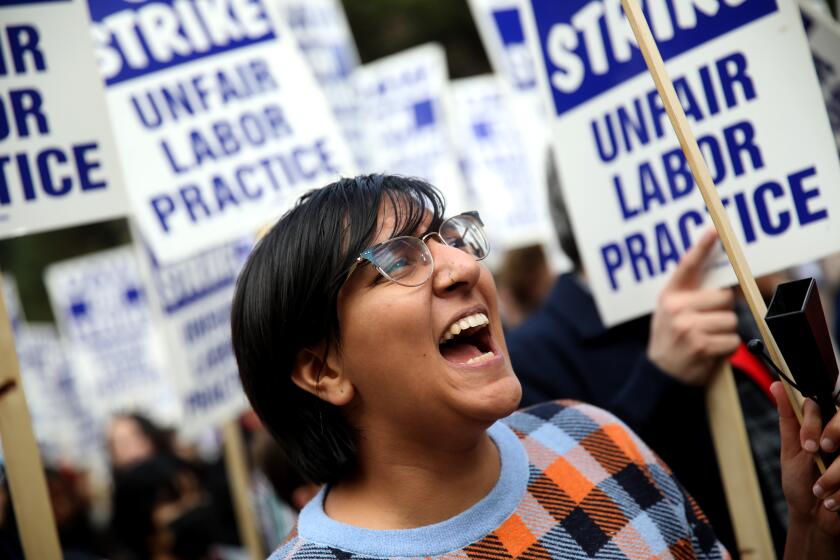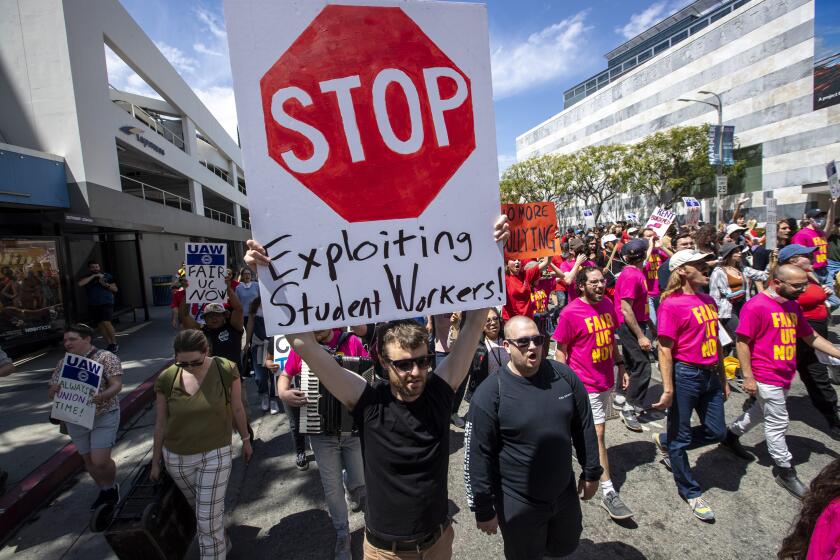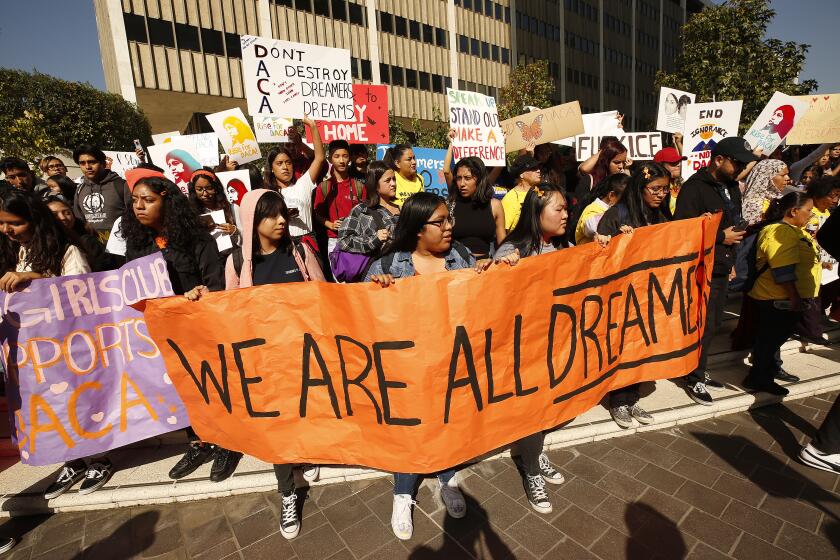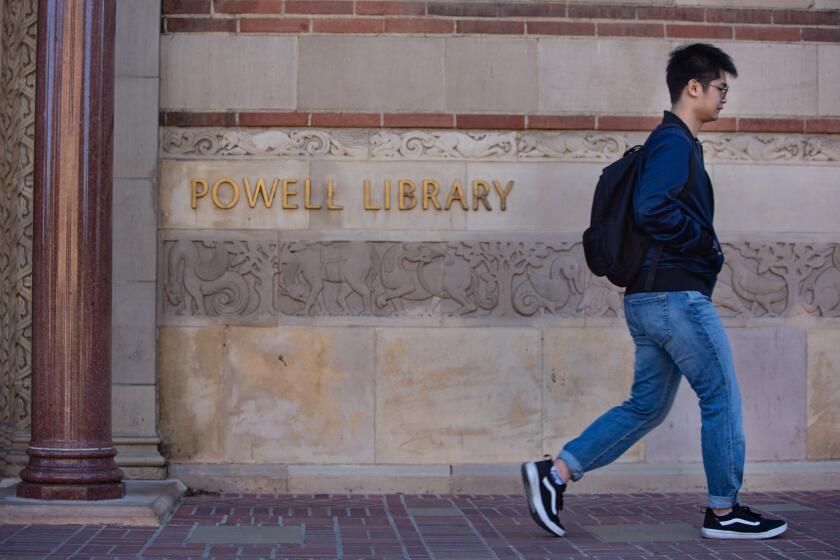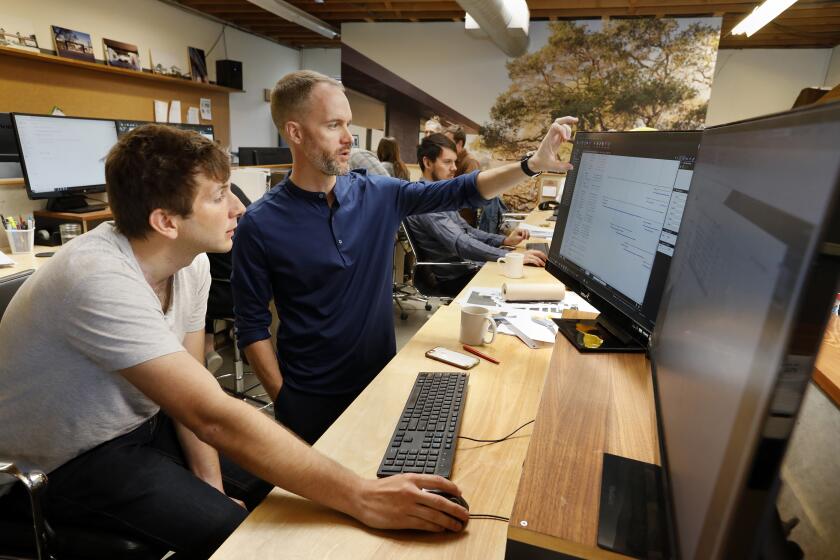UC officials call for mediator as strike by 48,000 academic workers causes systemwide disruptions

The UC strike is calling for better pay and benefits for teaching assistants, postdoctoral scholars, graduate student researchers, tutors and fellows.
- Share via
About 48,000 unionized academic workers across the University of California’s 10 campuses — who perform much of the teaching and research at the state’s premier higher education system — walked off the job Monday morning, calling for better pay and benefits.
In the nation’s largest strike of the year, teaching assistants, postdoctoral scholars, graduate student researchers, tutors and fellows across the UC system took to the picket line, prompting canceled classes, shuttered labs and other academic disruptions just weeks before final exams. The strike, which union leaders said was the largest at any academic institution in history, also included workers at the Lawrence Berkeley National Laboratory.
The massive work stoppage will continue Tuesday.
“UAW members at UC remain on strike, and we will be walking picket lines tomorrow,” Rafael Jaime, president of United Auto Workers Local 2865, which represents 19,000 of the 48,000 workers, said Monday night.
The UC strike is calling for better pay and benefits for teaching assistants, postdoctoral scholars, graduate student researchers, tutors and fellows.
After negotiations with the UAW continued throughout the weekend and Monday, UC officials are calling for a third-party mediator to be brought in.
“At this time, we believe that the best path to an agreement is with the aid of a third-party mediator,” Ryan King, a UC spokesperson, said in a statement Monday afternoon. “We continue to encourage the union’s partnership in pursuing mediation.”
Union bargaining team members met with UC officials on Monday for two hours and reached tentative agreements on three points, Jaime said.
“At this point, the priority should be round-the-clock bargaining in good faith as opposed to switching to a mediation process,” he said.
The workers are demanding significant pay increases, child-care subsidies, enhanced healthcare for dependents, longer family leave, public transit passes and lower tuition costs for international scholars.
While the two sides recently agreed on stronger protections against workplace bullying and abuse, UC’s proposals on wages remain far from the $54,000 base salary that union leaders say would be fair for graduate student workers — and would amount to more than double the workers’ average current pay of about $24,000 annually.
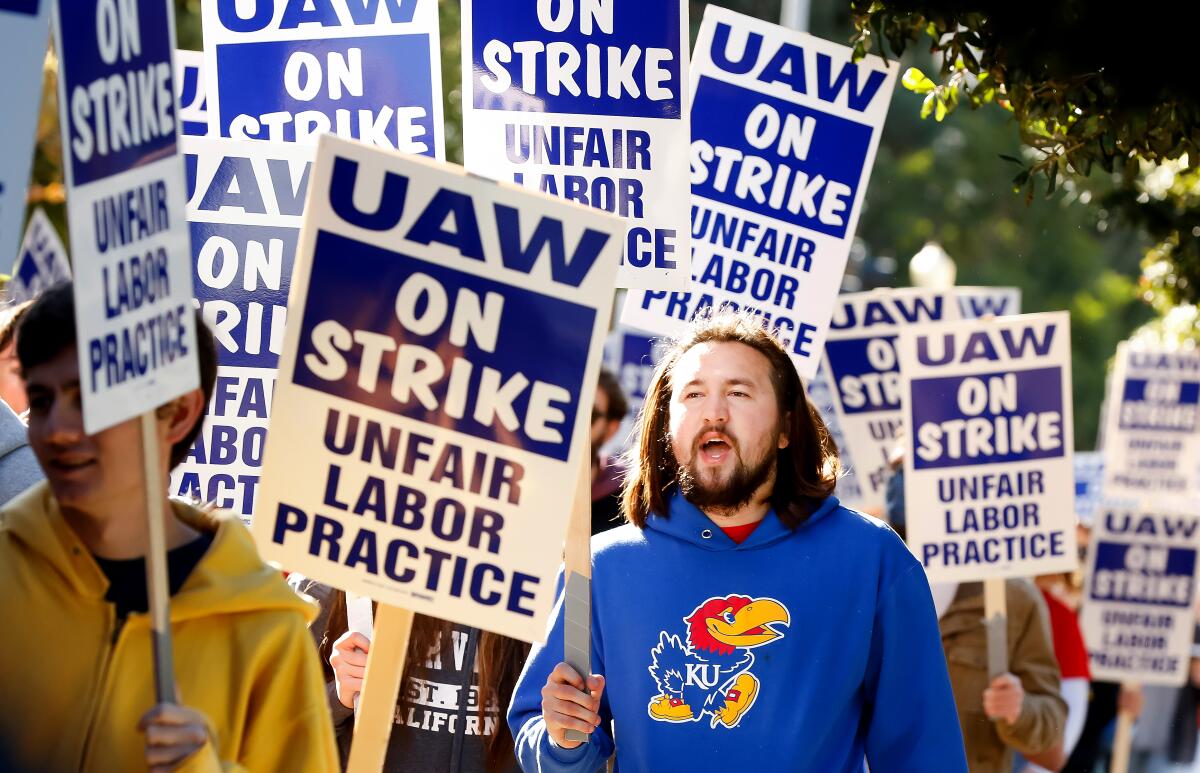
The university’s current proposal “would set the standard for graduate academic employee support among public research universities,” King said in the UC statement, noting that graduate students work part time while pursuing their degree and that their pay is “just one of the many ways in which they are supported as students.”
Under the university proposals, graduate student pay would be “among the top of the pay scale” for top public research universities and comparable to private universities such as Harvard, MIT and USC, King said.
“UC believes its offers are generous, responsive to union priorities, and recognize the many valuable contributions of these employees,” university officials wrote in an earlier statement about the negotiations, which have been ongoing since spring 2021.
The biggest sticking point in negotiations has remained compensation, Jaime said, adding that the university’s proposals don’t do enough to address affordable housing needs for graduate students and others fighting for higher pay.
“UC also wants to limit and control our earnings by calling some of it ‘student support,’ which would block a portion of our pay from being covered by our union contract,” he said.
UC has offered a salary scale increase of 7% in the first year and 3% in each subsequent year for teaching assistants and tutors, but workers have said that’s not sufficient.
“We are overworked and underpaid, and we are fed up,” said Jamie Mondello, a 27-year-old psychology graduate student worker at UCLA and member of UAW Local 2865 and Student Researchers United. “Our proposals bring everyone into a livable wage. We’re, as a whole, just asking to be treated with dignity. We really keep the UC running.”
Nearly 48,000 University of California graduate students -- the backbone of the esteemed higher education system who research, mentor and teach undergraduates -- are poised to strike.
Mondello said she makes about $37,000 a year as a fellow and is planning to add a teaching assistantship next quarter to help supplement her income. She was on the picket line at UCLA on Monday morning, along with hundreds of other academic workers, many holding signs that read, “UAW on strike. Unfair labor practice.”
“Forty-eight thousand strong,” they chanted. “We can fight all day long.”
Lavanya Nott, 30, a third-year graduate student in the geography department and a student researcher, said she makes $24,000 a year from her job and about $2,000 a year from her second job as an on-campus grader for teaching assistants who don’t speak English as their first language.
“It’s almost impossible to live in L.A. or most cities in California,” she said. “Many of us have second or third jobs.”
Nott called her income “poverty-level wages” and said 92% of graduate students are rent-burdened, meaning they spend 30% or more of their income on rent.
She lives in a one-bedroom apartment provided by UC housing with her partner, paying $1,500 a month combined. Though she doesn’t have a child, she said she knows parents are struggling because the UC child-care subsidies aren’t enough for care on UC campuses.
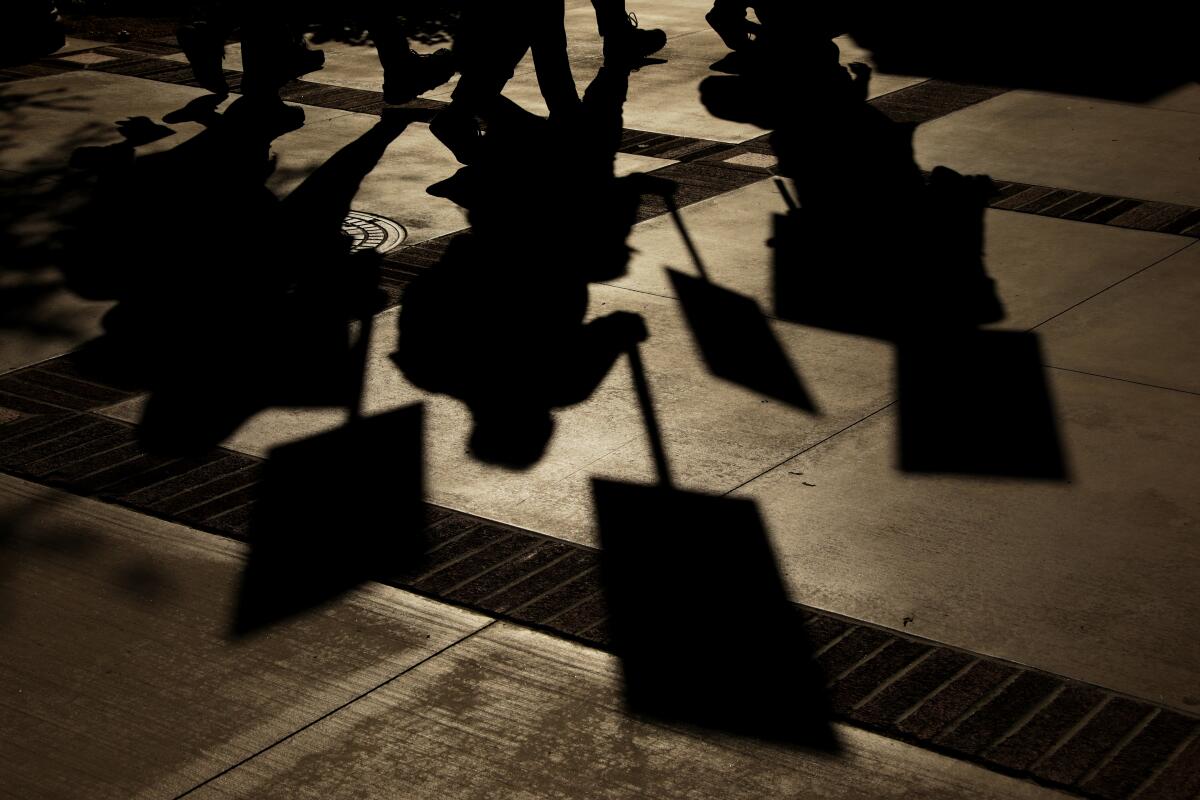
“We’re always thinking about how little money we have and how constrained we are financially, and I think it would give us some peace of mind and freedom to focus on our work and have some dignity,” Nott said. “We just want to be brought out of poverty.”
International students, the strikers said, have to pay non-residential tuition fees, which puts them on a “treadmill” to complete their degrees in five years because the university won’t cover their fees beyond that time.
“Postdocs, researchers, graduate student teaching assistants basically run the university in many ways,” Nott said. “We teach the majority of the classes. We grade more papers than any faculty member there is. We do cutting-edge research that brings in a huge amount of funding to the UC system. The demands that we’re asking for only make up 3% of the UC’s annual budget. It’s a really minuscule ask in terms of what UC can afford.”
It wasn’t immediately clear how many classes, labs or scheduled academic activities were interrupted Monday, but students at UCLA and at campuses across the state reported many classes canceled.
UC Irvine spokesperson Tom Vasich said campus leaders were “committed to instructional and research continuity,” including alternate forms of instruction such as hybrid classes.
The University is California is being pushed to break legal ground by hiring immigrant students without work authorization in a test of federal law that could alter tens of thousands of young lives.
He did not say how many classes were canceled but said student support resources remain open.
Most campuses did not directly respond to questions about how many classes were interrupted by the strike.
Ebony Morris, 21, a fourth-year undergraduate art student, said the discussion group meeting for one of her classes was canceled until the strike is over.
“TAs make a class,” she said. “It’s a smaller way to get everything you’re supposed to get in class.”
Morris said the grading of assignments and tests will also most probably be affected by the strike.
“I think UCLA should pay the people who work here,” she said. “If they need to strike, they need to strike. I feel like it’s a human right to be able to pay for your life.”
Breanna Reyes, 20, and Vanessa Salgado, 20, are both third-year undergraduate students and Spanish majors.
Reyes said one of her classes was canceled indefinitely and another was moved online until the strike is over. Salgado said a couple of her classes and discussion groups were canceled.
“Obviously, there’s disruptions in grading and classes, but I think the point is to cause disruption and to make staff aware of the problems that are going on, so I don’t really mind,” Salgado said.
“We truly are here because we want to make academia better. No one wants a strike, and we have been forced to be in this position just to get fair working conditions and a fair contract.”
— Jamie Mondello, a psychology graduate student worker at UCLA
Reyes said some of the students were thinking about joining the strike in solidarity.
“In big lectures, we don’t get that individual attention and we don’t get to ask as many questions,” Reyes said. “In our discussion groups, we get to express ourselves more, ask questions about homework, get feedback on it and it improves our overall grade, so I think missing out on that will hinder the experience from our first quarter.”
Mondello, the UCLA psychology graduate student, said she appreciates that a lot of undergraduates understand the strike isn’t an effort to punish them and faculty, but is necessary for academic workers.
“We truly are here because we want to make academia better,” Mondello said. “No one wants a strike, and we have been forced to be in this position just to get fair working conditions and a fair contract.”
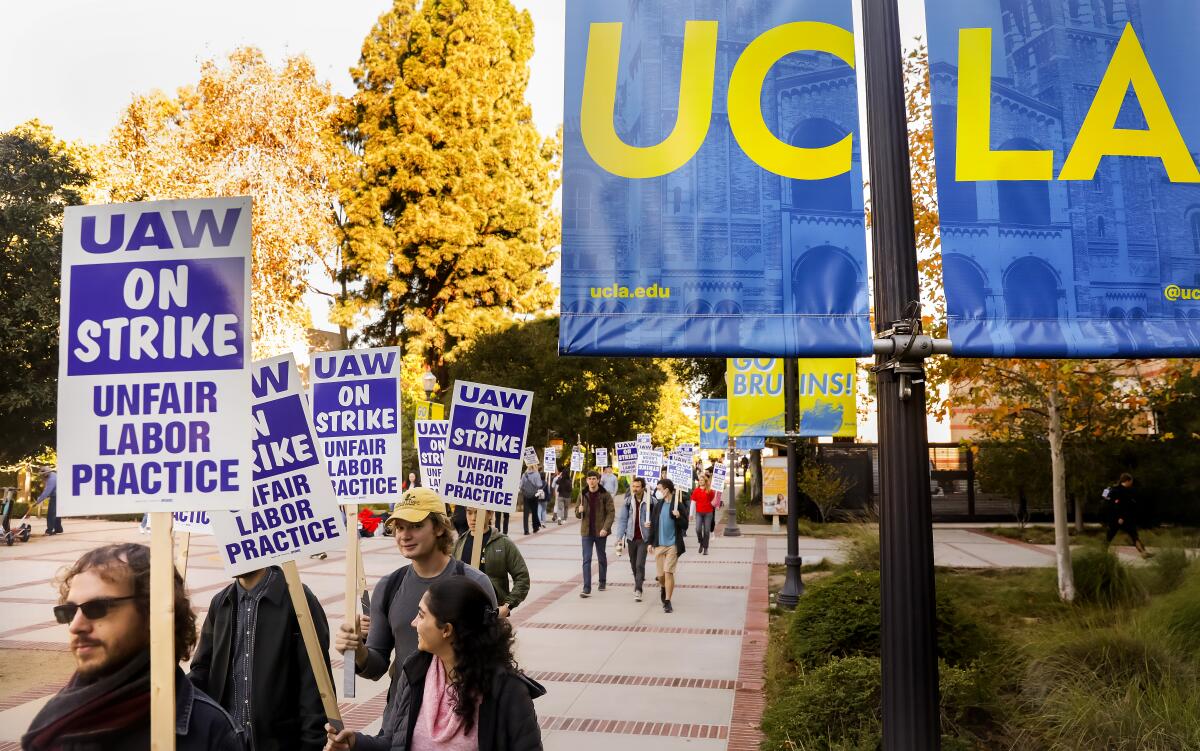
She said it’s especially concerning because union leaders have accused the university on multiple occasions of engaging in unlawful bargaining tactics, such as circumventing the bargaining table and intimidation tactics, and filed 25 unfair labor practice claims with the state’s Public Employment Relations Board. In six cases, the board has issued complaints, which means the board found sufficient evidence that an unfair practice may have been committed.
King did not specifically respond to questions about the allegations but said UC officials continue to negotiate in “good faith.” The university has repeatedly denied any unlawful behavior and said differences should be worked out at the bargaining table, not on picket lines.
The U.S. Supreme Court hearings on affirmative action this week highlighted widespread fears among Asian Americans that they face bias in selective college admissions.
At UC Irvine’s main plaza, hundreds of striking academic workers shouted “union power” around noontime.
Kien Le, 27, is a teaching assistant in the English Department and said he joined the main picket for better pay and job security. He said he makes $20,000 and lives in university-owned campus housing.
“The university has been engaging in a lot of unlawful behaviors, like negotiating with specific departments,” he said. “We just want them to negotiate with us in good faith.”
Le said he recently filed a grievance with the support of his union after the university rescinded a job offer last summer, a difficult time for workers like him who work nine months out of the academic year. It took Le more than a month to get his job back.
“The university is our employer and also our landlord,” he said. “I would have been behind on my rent.”
It will soon be “three strikes and you’re fined” for some employers in California that don’t offer a retirement plan or sign their employees up for CalSavers.
Jessie Altieri, 27, shared similar rent struggles from a separate picket on the Irvine campus. The student researcher is employed year-round but makes $35,000 a year. She works 40 hours a week doing cancer and biology research but still struggles to make ends meet, even when living in university-owned housing.
“It’s subsidized, but not subsidized enough,” Altieri said. Other student researchers do similar work but are sometimes paid $10,000 less per year, she said.
“A new contract would fix that,” Altieri added. “Everyone would get the same pay.”
A group of 33 state lawmakers sent a letter in support of the graduate student workers urging UC President Michael Drake to bargain in good faith.
“The UC is one of the top public university systems and research institutions in the world, in no small part because of its ability to attract the most talented scholars from a wide array of backgrounds,” the letter reads. “But the UC system cannot live up to its mission and reputation if its own employees do not feel respected.”
Last November, the university system narrowly avoided a strike planned by about 6,500 lecturers after reaching a last-minute agreement that improved their job security and included raises.
Times staff writers Teresa Watanabe and Gregory Yee contributed to this report.
More to Read
Sign up for Essential California
The most important California stories and recommendations in your inbox every morning.
You may occasionally receive promotional content from the Los Angeles Times.
